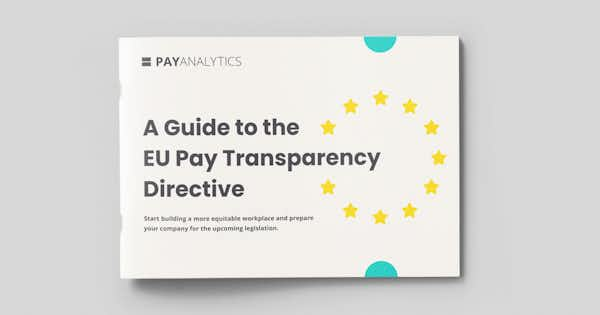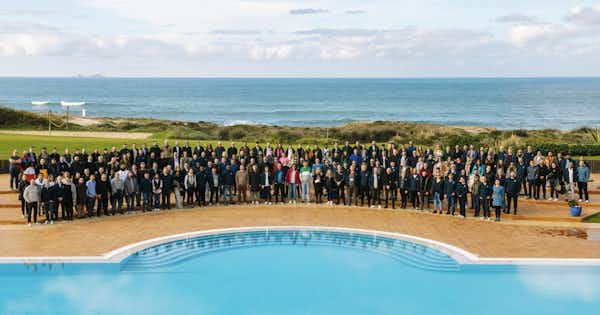Cómo prepararse para la Directiva europea sobre transparencia salarial | Obtén nuestro E-book gratis
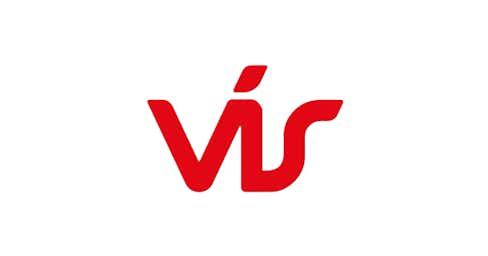
VÍS — Working towards gender equality
VÍS, the largest insurance company in Iceland, offers comprehensive insurance solutions in the consumer and corporate sectors. They have close to 200 employees, mainly in Reykjavik and in different field offices around the country.
The company has a long history of action and emphasis on gender equality and equal pay, dating back to its first equality and equal pay strategy in 2002. Since then, it has regularly reviewed its workplace policies and practices to ensure that gender discrimination does not find a foothold.
One way VÍS has been working towards gender equality is by changing the gender composition in its jobs through its recruiting practices. Many new hires have run counter to traditional gender job roles. This means that VÍS has proactively hired women in management and executive positions and has employed more men in formerly female-dominated roles like customer service and other frontline jobs.
VÍS became a partner of UN Women and adopted its Women's Empowerment Principles in 2011. Through this partnership, VÍS committed to becoming a social leader on gender equality. In addition, VÍS uses UN sustainability goal no. 5, "Achieve gender equality and empower all women and girls," as a guiding light in its operations.
The company started working towards Equal Pay Certification years before it became mandatory by law in Iceland in 2018. As of 2014, VÍS was already on its way to implementing Equal Pay Certification and viewed it as critical for its success.

We at VÍS believe that we are a more attractive workplace if we prioritize equality. We know from experience that qualified and ambitious people want to work for a company that places equality first. After receiving the certification, we could feel that our employees were very proud to be part of our company. We have seen a growth in job satisfaction and engagement as a result.
JOB EVALUATION
Anna Rós Ívarsdóttir, the director of HR at VÍS, has been with the company and has managed its equal pay efforts for over 20 years. Reflecting on this process, Anna Rós says, "The company wanted its equal pay practices certified to attest to its status as a leader on equality."
VÍS uses a job evaluation system with different factors to determine each job's value to the company's operations. To create this system, the HR team worked with the management team to assess the value of each job. The executive board took part in choosing the method and in the valuation of different factors, and it was a great supporter of the project from the beginning.
"It was essential to get the senior management buy-in and their say in which competencies are necessary for the operations," Anna Rós recalls. "The team held meetings with managers on the existing job classification and how it served the operations. Then, to help us with the job evaluation, we in the HR department adapted it to our operations at VÍS. In addition, to prevent subjective evaluation or discrepancies between the estimates from our managers, we have included detailed descriptions of the requirements for each level. At this point, it is crucial to remember that we are evaluating the roles but not the performance of our employees." Although creating this job evaluation system was time-consuming, it was necessary for the company to analyze whether the pay structure was fair and paid equally for employees working in jobs of equal value, even though the jobs were different. Previously, the company's leadership, management, and HR teams only had vague ideas about which jobs were comparable, but the job evaluation process created a much clearer, shared understanding.
Looking back, Anna Rós says she would have liked to have worked with a consulting service on equal pay systems and how to construct them. But, unfortunately, since VÍS was one of the first companies to implement Iceland's equal pay standard, there were no such services available at the time.
SALARY ANALYSIS
VÍS now conducts salary analysis four times a year. If the investigation reveals pay discrepancies for equally valuable jobs, the HR team looks for explanations from the managers and corrects employees' wages accordingly. Results of the salary analyses are accessible to employees. Anna Rós says that the company's emphasis on equal pay has resulted in higher employee loyalty and pride in being part of VÍS and that its transparent, equal pay system increases trust in management.
CLOSING THE GENDER PAY GAP
The company is proud of its success in closing the gender pay gap quickly. In 2021, its pay gap measured in favor of women for the first time by 0.05%. This negligible number indicates no actual gender pay gap at VÍS.
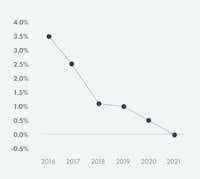
Adjusted Gender Pay Gap at VÍS from 2016 to 2021
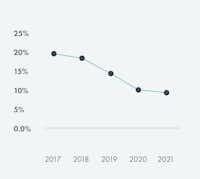
Unadjusted Gender Pay Gap at VÍS from 2016 to 2021
The company also found that its unadjusted pay gap – the difference in the average pay of males and females – has also gone down in just four years, from 19.3% in 2017 to 10.2% in 2021. This is both a result of closing the adjusted gender pay gap and changing the gender composition in the company's jobs.
I would recommend for companies is to get access to powerful analytical software like PayAnalytics to measure results
ADVICE TO OTHERS
What would Anna Rós advise HR professionals or managers just starting on their equal pay journey? "First, I recommend that anyone implementing equal pay hire a consultant to speed up the work. We were pioneers, so those were not accessible to us. Today companies have more available resources to help them on this journey. The other thing I would recommend for companies is to get access to powerful analytical software like PayAnalytics to measure results and get recommendations on the next steps to close the pay gap."
VÍS is a company that views equality and equal pay as a social issue and sustainability. It has also found that its equal pay efforts have made the company an attractive workplace and given it a positive brand image. As Anna Rós reflects, "We at VÍS believe that we are a more attractive workplace if we prioritize equality. We know from experience that qualified and ambitious people want to work for a company that places equality first. After receiving the certification, we could feel that our employees were very proud to be part of our company. We have seen a growth in job satisfaction and engagement as a result."
Download the Customer Success Story as a PDF
Download the article as A4
Download the article as US Letter

